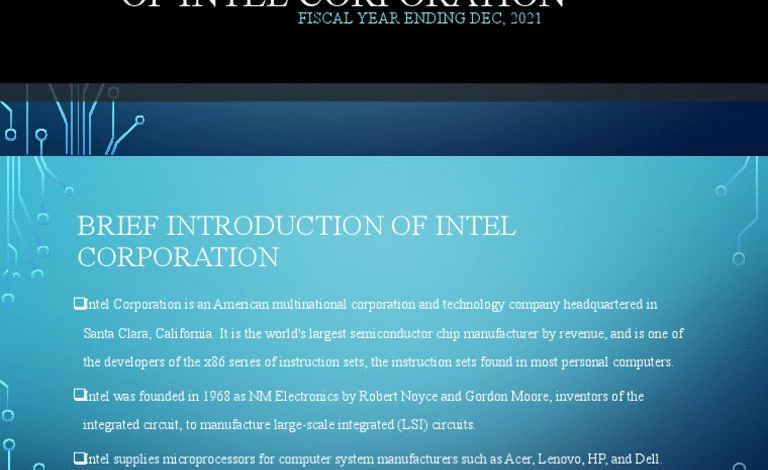Intel Equity Investment Plan Amid Stock Drop and Challenges

Intel equity investment is becoming a focal point as the tech giant seeks to stabilize its financial standing amidst recent challenges. Following a significant 7% drop in its stock, the company is rumored to be negotiating fresh equity infusions with major investors, hoping to bounce back from years of declining sales. This latest move comes on the heels of a $2 billion capital investment from SoftBank, which has sparked interest in how the CHIPS Act funding could intertwine with equity stakes for the U.S. government. With intensifying competition in artificial intelligence semiconductors, Intel is aware that securing additional funding is crucial to meet ever-evolving market demands. Furthermore, the recent leadership change at Intel raises questions about the direction and innovations the new CEO will bring to offset these financial hurdles.
The current landscape of investment in Intel, often dubbed a pivotal player in the semiconductor industry, highlights ongoing efforts to rejuvenate the company’s financial health. After experiencing a notable decrease in stock value, discussions are underway for potential capital injections from various investors that could reshape Intel’s market presence. Enhanced focus on strategic funding, including considerations under the CHIPS Act, points to a broader initiative to regain competitive footing, particularly in the realm of AI-driven technologies. Notably, Intel’s recent executive shifts signal a shift towards a more aggressive strategy to address the challenges posed by competitors. As the company navigates these turbulent waters, the emphasis on partnerships and investments appears more critical than ever.
Current Financial Challenges for Intel
Intel’s recent stock drop of over 7% signals urgent financial challenges the company is facing in a competitive semiconductor market. The fall came despite a temporary rally spurred by a substantial $2 billion capital investment from SoftBank, highlighting the volatility of Intel’s stock as it attempts to stabilize its finances. With declining sales and diminishing market share, the company is on the brink of a financial transformation, making discussions about securing additional equity investments a priority.
This downward trend not only raises concerns among investors but also places tremendous pressure on Intel to innovate and regain its foothold in the semiconductor industry. The collaboration with SoftBank poses a strategic opportunity for Intel to leverage external funding to bolster its manufacturing capabilities. However, as indicated in recent reports, the need for further equity financing reveals deeper issues, particularly when faced with competition from emerging technologies in artificial intelligence semiconductors.
Frequently Asked Questions
What impact has the Intel stock drop had on investor confidence?
The recent Intel stock drop, which saw shares decline by more than 7%, has raised concerns among investors regarding the company’s stability and future prospects. Following this drop, some investors are cautious, especially given Intel’s ongoing discussions for equity investment and the need for capital to support operations and innovations.
How does SoftBank’s investment in Intel influence the company’s future efforts?
SoftBank’s $2 billion investment in Intel is a significant boost, providing essential capital during a challenging financial period. This investment is expected to support Intel’s development in artificial intelligence semiconductors, which is crucial as the company aims to reclaim market share and drive growth.
What role does the CHIPS Act funding play in Intel’s equity investment strategy?
The CHIPS Act funding is intended to enhance the semiconductor industry’s capabilities in the U.S. While the government seeks an equity stake in Intel for this funding, the company views some terms as potentially dilutive to existing shareholders. Intel’s challenge lies in balancing these funds while attracting further equity investments to stabilize and grow.
How is Intel preparing for a turnaround after recent leadership changes?
Intel is actively working to reverse its declining sales and market share through strategic leadership changes, including the appointment of Lip-Bu Tan as CEO. The new leadership aims to navigate the company through challenges in securing equity investment and leveraging opportunities in advanced semiconductors, particularly in artificial intelligence.
What challenges does Intel face in leveraging the artificial intelligence boom in semiconductors?
Despite the growing demand for artificial intelligence semiconductors, Intel faces the challenge of not having established a robust customer base or market presence. Significant investments are necessary to innovate and manufacture AI technologies, and attracting equity investment will be critical for Intel to capitalize on this booming sector.
What does Intel’s search for funding indicate about its financial health?
Intel’s pursuit of additional equity investment, particularly in light of its stock drop and operational challenges, indicates a pressing need for capital to support ongoing projects and innovation. This need suggests that the company is currently in a fragile financial state, prompting discussions with major investors.
How have leadership changes at Intel affected its equity investment strategy?
The recent leadership changes at Intel, including the CEO transition, are pivotal as they set a new strategic direction for the company. The new management’s approach to equity investment discussions and relationships with potential investors like SoftBank will be crucial in shaping Intel’s financial recovery and growth.
What are the implications of converting CHIPS Act funds into equity for Intel?
Converting CHIPS Act funds into equity could dilute existing shareholders’ stakes, which Intel views as a disadvantage. The company needs to navigate this carefully while securing necessary funding, as maintaining shareholder value is critical amid its challenges in the semiconductor market.
| Key Point | Details |
|---|---|
| Current Equity Discussions | Intel is negotiating with major investors for an equity infusion at a reduced price. |
| Stock Performance | Intel’s stock dropped over 7% after a previous rally due to SoftBank’s investment. |
| CHIPS Act Funding | Commerce Secretary stated that the government requires an equity stake in Intel for funding. |
| Funding Needs | Intel is seeking additional funding beyond SoftBank to support customer demands. |
| Challenges and Turnaround | Intel is facing challenges in adapting to the AI semiconductor boom and declining market share. |
| Leadership Changes | Lip-Bu Tan has been appointed CEO amid significant leadership reshuffle. |
| Political Influence | President Trump has reacted to Tan’s leadership with mixed responses, urging for his resignation. |
Summary
Intel equity investment is a critical topic as the company navigates through discussions with major investors for much-needed equity. With its stock price fluctuations and the pressing necessity to enhance its funding through the CHIPS Act, Intel’s strategic moves are vital for its future. The challenges faced by Intel, particularly in leveraging the AI revolution and revamping its leadership, further amplify the importance of securing robust investments. As the company endeavors to restore its market position and innovate in the semiconductor landscape, the implications of these equity discussions will significantly shape Intel’s trajectory moving forward.




